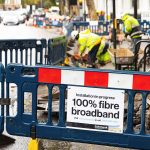Michael Gove MP Claims Brexit to Deliver More Cash for Broadband
The Government’s Environment Secretary, Michael Gove MP, has told a meeting of UK farmers that fast broadband and 4G mobile coverage remains “patchy and poor in many areas” and that true universal coverage could be “paid for by the money we no longer have to give to the EU.”
At this point we have to take a step back because any discussion of Brexit and future funding invariably results in an ugly mess of questionable claims and counter-claims from all sides (e.g. £350m per week extra for the NHS). Suffice to say that anything stated by any politician along these lines has to be taken with a significant pinch of salt, at least until we know what the final Brexit and trade settlement will actually deliver.
On this point it’s well known that Michael Gove is very pro-Brexit and so his speech to the NFU Farming Conference 2018, which took place yesterday, should be taken in that context. We’ve pasted the relevant paragraphs below and will then examine a few of the remarks.
Advertisement
Michael Gove MP said:
It is unjustifiable that in the country that first guaranteed universal mail provision, invented the telephone and television and pioneered the World Wide Web that broadband provision is so patchy and poor in so many areas.
Farming cannot become as productive as it should be, rural economies cannot grow as they should, and new housing cannot be provided in rural areas as so many hope to see and we cannot have an economy that works for everyone unless everyone has access to decent broadband and mobile coverage.
Daily life, especially active economic life, is becoming increasingly difficult for those without access to fast, reliable and affordable broadband. It is the necessary infrastructure of all our lives in these times, as essential as mains electricity or clean drinking water.
And yet rural communities in Britain are denied good access to this contemporary utility today just as the farmers of the Hill Country in Texas were denied electricity in Congressman Lyndon Johnson’s day – until the New Deal transferred power to the people.
If we could provide a universal service obligation for mail in the past – so that everyone in the country knew their post would be collected and delivered on the same basis as every other citizen – and if we can provide a universal guarantee now that every citizen will be given the same access to the healthcare they need when they need it, then why should we persist in discriminating over access to the essential service that is decent broadband?
Progress has been made, we have already raised the availability of super-fast broadband from 65% of premises in 2010 to 95% by the end of 2017, but more needs to be done. We have committed to making high speed broadband available to all by 2020 and mobile coverage to 95% of the UK by 2022. And as you will have seen, this weekend we announced a new initiative to use church spires to boost broadband and mobile connectivity in rural areas. This kind of creative thinking shows how our nation’s beautiful heritage can work hand in hand with twenty-first century innovation. But we still need to go further.
And in indeed face down some of the vested interests. Some say that if individuals choose to live in rural areas, where broadband provision and mobile phone coverage may cost more, that choice should not be “subsidised” by others in urban areas. To which I say, but where do the urban dwellers get their food from, who keeps the countryside beautiful for them, who protects the landscape, keeps our nation’s green lungs breathing, who maintains the health, beauty and balance of nature for future generations? The people in rural areas who are currently being deprived an important service so many take for granted and need it now.
We’re planning to spend north of £60 billion on HS2, 30 times as much as it would cost to provide universal superfast broadband for everyone in the country. Surely investment in broadband is just as vital, and an urgent part of improving our critical national infrastructure.
Of course inside the EU, rules on state aid have prevented us from investing in broadband in a way that is best for the UK. Outside the EU, just one fifth of our annual net contribution to the EU could transform our national infrastructure.
The Prime Minister has made clear that the days of the UK making vast annual contributions to the EU will be over. And when we leave the EU we can put that money towards domestic priorities, like making our digital infrastructure work by improving rural broadband and connectivity overall. I will be working closely with my fantastic colleague, Matt Hancock, the new DCMS Secretary of State and I know as a rural MP he shares my passion for sorting this out.
Universal broadband and 4G coverage for all – paid for by the money we no longer have to give to the EU – that is what we mean by taking back control.
The speech is at times a little convoluted, not least in the way that it seems to dart at one point between calling for “universal superfast broadband for everyone in the country” and the next it supports the Government’s commitment to “making high speed broadband available to all by 2020 and mobile coverage to 95% of the UK by 2022.”
On the above point the eagle eyed will note that Gove’s “high speed broadband available to all by 2020” remark is actually a veiled reference to the 10Mbps+ Universal Service Obligation (USO), which is crucially NOT the same as calling for universal coverage of “superfast broadband” (defined as 24Mbps+ or 30Mbps+).
Then we have the open question of how much money, if any at all, would the government actually be willing to commit toward broadband (i.e. when supposedly extracted from existing contributions to the EU). This seems to overlook certain balancing issues with the current Brexit bill, as well as the potential impact upon GDP growth and the fact that other politicians seem to be promising the same money for almost everything under the sun. As a side note the EU has also contributed money to various UK broadband projects, such as in Cornwall.
Likewise there’s the point about State Aid rules, which again could still be impacted by the final Brexit agreement. In theory if the UK does completely extricate itself from EU state aid rules then that might allow greater flexibility, such as by making it easier to put public funding toward the deployment of closed broadband networks in rural areas rather than open access ones (wholesale). The economic model for a closed network is easier for ISPs to make but that could also reduce consumer choice.
Advertisement
Overall the speech calls for change, while at the same time struggling to clarify precisely what such change would actually deliver versus the existing strategy. Meanwhile the shadow being cast by Brexit continues to create more questions than answers.
Mark is a professional technology writer, IT consultant and computer engineer from Dorset (England), he also founded ISPreview in 1999 and enjoys analysing the latest telecoms and broadband developments. Find me on X (Twitter), Mastodon, Facebook, BlueSky, Threads.net and Linkedin.
« Quick Update on the Virgin Media Hub 3 Cable Router Latency Fix UPDATE3

















































Comments are closed